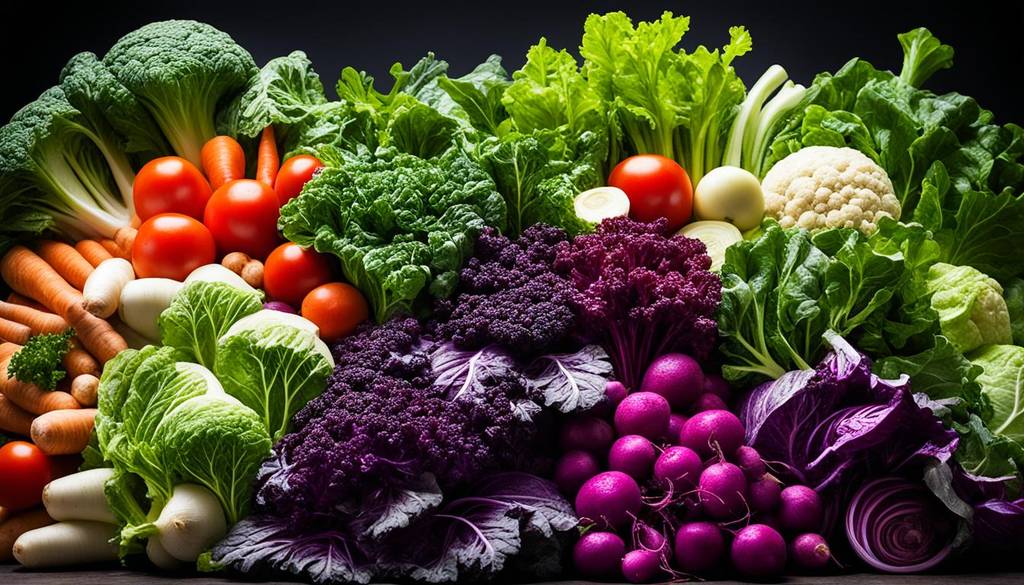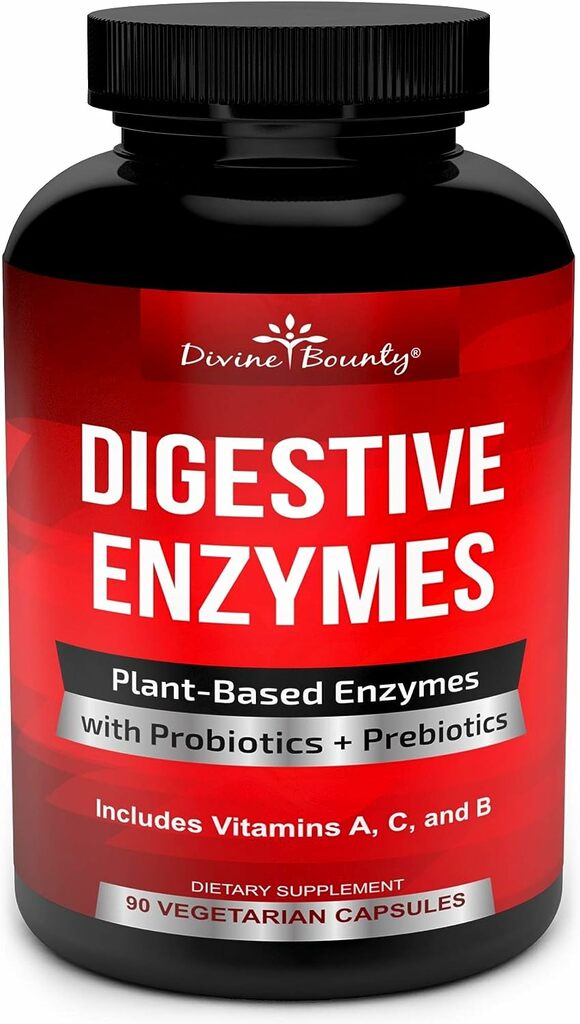Are you aware of the vital role that vitamin K plays in your overall health? From blood clotting to bone health, this essential nutrient offers numerous benefits that you might not be aware of. Understanding the importance of vitamin K in your diet can empower you to make informed choices to maintain optimal health. So, let’s delve into the world of vitamin K and discover its incredible benefits and how you can ensure you’re getting enough.
Key Takeaways:
- Vitamin K plays a crucial role in blood clotting and bone health
- Deficiency in vitamin K can lead to increased bleeding and bone fractures
- Leafy greens, oils, and fermented foods are excellent sources of vitamin K
- Vitamin K supplements may be necessary in certain situations
- Understanding vitamin K interactions with medications is important
Understanding Vitamin K and Its Essential Functions
Vitamin K is a crucial nutrient that plays a vital role in various functions within the body. It is important to understand the importance of vitamin K and its specific functions to prioritize its inclusion in your diet.
The Role of Vitamin K in Blood Clotting
Vitamin K is well-known for its role in blood clotting. It helps in the production of clotting factors, which are proteins that promote the formation of blood clots. Without adequate vitamin K, the blood clotting process can be impaired, leading to an increased risk of bleeding disorders.
Vitamin K Impact on Bone Health
Vitamin K is essential for maintaining healthy bones. It supports the synthesis of proteins involved in bone metabolism, which help maintain bone density and strength. Adequate vitamin K intake is crucial for preventing osteoporosis and reducing the risk of fractures.
Vitamin K as a Fat-Soluble Nutrient
Vitamin K is classified as a fat-soluble nutrient. This means that it is absorbed and stored in the body’s fatty tissues. Unlike water-soluble vitamins, fat-soluble vitamins can be stored in the body for longer periods, which allows for a more sustained supply of vitamin K when dietary intake is low.
Nutritional Profiles: Vitamin K1 and K2
Vitamin K is a vital nutrient that exists in different forms, notably vitamin K1 and vitamin K2. Each form has distinct nutritional profiles and plays essential roles in the body’s overall health. They are derived from different sources and have varied impacts on human physiology.
Phylloquinone – The Plant-Sourced Vitamin K1
Phylloquinone, also known as vitamin K1, is primarily found in plant-based sources. Leafy greens such as kale, spinach, and broccoli are excellent sources of phylloquinone. As a fat-soluble vitamin, it is important to consume phylloquinone with sources of dietary fat for optimal absorption.

Menaquinone – The Animal-Based and Fermented Vitamin K2
Menaquinone, commonly referred to as vitamin K2, is derived from animal-based foods and fermented products. Foods such as liver, eggs, cheese, and natto (a traditional Japanese dish) are rich sources of menaquinone. The fermentation process enhances the bioavailability of vitamin K2 in these foods.
Both phylloquinone and menaquinone have unique properties and contribute to the overall vitamin K intake necessary for optimal health. Including a variety of plant-based and animal-based vitamin K sources in your diet helps ensure an adequate intake of this essential nutrient.
Distinguishing Vitamin K from Potassium
While both vitamin K and potassium are essential nutrients, they serve different functions in the body. Understanding the differences between vitamin K and potassium can help you make informed dietary choices and ensure optimal health.
Vitamin K is a group of vitamins that play a crucial role in blood clotting and bone health. It helps activate proteins that are responsible for proper blood clotting, preventing excessive bleeding. Vitamin K also supports bone metabolism and helps maintain bone density, reducing the risk of fractures and osteoporosis.
Potassium, on the other hand, is a mineral that plays a vital role in maintaining proper water balance, nerve function, and muscle contractions. It helps regulate blood pressure, supports heart function, and promotes overall cardiovascular health.
Although both vitamin K and potassium contribute to a healthy body, they have distinct functions and benefits. It’s important to incorporate both nutrients into your diet to ensure a balanced and nutritious intake.
To visualize the differences between vitamin K and potassium, refer to the table below:
| Vitamin K | Potassium |
|---|---|
| Plays a role in blood clotting | Maintains water balance in the body |
| Supports bone health and density | Regulates blood pressure |
| Essential for preventing excessive bleeding | Facilitates nerve function and muscle contractions |
By understanding the differences between vitamin K and potassium, you can make informed dietary choices to ensure you’re meeting your body’s nutrient needs. Incorporate vitamin K-rich foods like leafy greens, broccoli, and Brussels sprouts, along with potassium-rich foods such as bananas, avocados, and beans, into your diet for optimal health.

Unpacking the Health Benefits of Vitamin K
Vitamin K is a vital nutrient that offers a range of health benefits. It plays a crucial role in preventing osteoporosis and promoting heart health. Understanding these benefits underscores the importance of incorporating vitamin K into your diet.
Vitamin K’s Involvement in Osteoporosis Prevention
Vitamin K is essential for maintaining bone health and density, making it a key player in the prevention of osteoporosis. It supports the synthesis of proteins involved in bone metabolism and helps ensure strong and healthy bones.
Including vitamin K-rich foods such as leafy greens, broccoli, and Brussels sprouts in your diet can contribute to maintaining optimal bone density and reducing the risk of osteoporosis.
The Importance of Vitamin K for Heart Health
Vitamin K also plays a critical role in maintaining heart health. It helps prevent the mineralization of arteries, which can contribute to cardiovascular diseases. Additionally, adequate vitamin K intake supports normal blood pressure levels.
By including vitamin K in your diet, through foods like kale, spinach, and collard greens, you can support a healthy cardiovascular system and reduce the risk of heart disease.

Identifying the Signs of Vitamin K Deficiency
Vitamin K deficiency, although rare, can lead to serious health consequences. It is essential to be able to identify the signs and symptoms of vitamin K deficiency to ensure early intervention. Additionally, certain risk factors can increase the likelihood of vitamin K deficiency, and recognizing these factors is crucial for prevention. This section will provide an overview of the signs, symptoms, and risk factors associated with vitamin K deficiency, both in adults and newborns.
Risk Factors for Vitamin K Deficiency
There are several risk factors that may contribute to vitamin K deficiency in individuals. These include:
- Prolonged use of antibiotics, which can disrupt the gut bacteria responsible for synthesizing vitamin K
- Digestive disorders, such as Crohn’s disease or celiac disease, that affect the absorption of vitamin K
- Liver disease or dysfunction, as the liver plays a key role in storing and activating vitamin K
- Malnutrition or poor dietary intake of vitamin K-rich foods
- Certain medications, such as blood thinners, that interfere with vitamin K metabolism
Recognizing Symptoms in Adults and Newborns
The symptoms of vitamin K deficiency can vary depending on the severity of the deficiency. In adults, common symptoms may include:
- Easy bruising or excessive bleeding
- Slow blood clotting after injury or surgery
- Unexplained or recurrent nosebleeds
- Heavy or prolonged menstrual periods
- Weakness or fatigue
In newborns, vitamin K deficiency can lead to a rare but potentially life-threatening condition called vitamin K deficiency bleeding (VKDB). Symptoms of VKDB in newborns may include:
- Bleeding from the umbilical cord or circumcision site
- Bleeding into the skin, resulting in small red or purple spots
- Bleeding from the nose or gastrointestinal tract
- Irritability or excessive crying
It is important to seek medical attention if any of these symptoms occur, especially in newborns, as prompt treatment can prevent complications associated with vitamin K deficiency.

Identifying the signs of vitamin K deficiency and understanding the associated risk factors can help individuals take appropriate actions to prevent or address this deficiency. Early recognition and intervention are key to maintaining optimal health and well-being.
Dietary Sources: vitamin k Rich Foods
Incorporating vitamin K-rich foods into your diet is essential to ensure adequate intake. Vitamin K is found in various food sources, with some being particularly rich in this essential nutrient. By including these foods in your meals, you can maintain optimal vitamin K levels to support your overall health and well-being.
Leafy Greens – Nature’s Vitamin K Powerhouses
Leafy greens, such as kale and spinach, are known as nature’s vitamin K powerhouses. These vegetables are not only packed with vitamins and minerals but also offer a significant amount of vitamin K. Just one cup of cooked kale contains over 1000% of the recommended daily intake of vitamin K(1). Adding leafy greens to your salads, stir-fries, or smoothies can be an excellent way to boost your vitamin K levels.

Other Vitamin K Foods – From Oils to Eggs
Aside from leafy greens, there are other food options that contribute to vitamin K intake. Vegetable oils, such as soybean oil and canola oil, contain vitamin K and can be used in cooking and dressing(2). Consuming eggs is another way to incorporate vitamin K into your diet, as they contain a moderate amount of this nutrient(3). Including these foods in your meal planning can provide additional sources of vitamin K beyond leafy greens.
| Food Source | Vitamin K Content (mcg per 100g) |
|---|---|
| Kale (cooked) | 817 |
| Spinach (cooked) | 482 |
| Cabbage | 76 |
| Olive Oil | 60 |
| Soybean Oil | 38 |
| Canola Oil | 15 |
| Egg | 0.3 |
Vitamin K-rich foods, such as leafy greens and vegetable oils, provide essential nutrients for maintaining optimal health. Incorporating these foods into your diet can support your vitamin K levels and contribute to overall well-being.
By focusing on vitamin K-rich foods, you can ensure that your body receives this essential nutrient. Whether you choose to incorporate leafy greens, oils, eggs, or a combination of these foods, maintaining a diverse and balanced diet is key for optimal vitamin K intake.
References:
(1) USDA FoodData Central, “Kale, cooked,” https://fdc.nal.usda.gov/fdc-app.html#/food-details/169337/nutrients
(2) USDA FoodData Central, “Oil, canola,” https://fdc.nal.usda.gov/fdc-app.html#/food-details/170270/nutrients
(3) USDA FoodData Central, “Egg, whole, cooked, hard-boiled,” https://fdc.nal.usda.gov/fdc-app.html#/food-details/333999/nutrients
The Lowdown on Vitamin K Supplements
While it is generally possible to get enough vitamin K through a balanced diet, supplements may be necessary in certain situations. Vitamin K supplements provide additional support and can help ensure optimal intake of this essential nutrient.
There are several benefits to incorporating vitamin K supplements into your routine. These include:
- Increasing vitamin K levels: Supplements can help raise vitamin K levels in individuals who have a deficiency or struggle to meet their recommended intake through food alone.
- Supporting bone health: Vitamin K plays a crucial role in bone metabolism and helps maintain bone density. Supplements can provide an extra boost of this nutrient for improved bone health.
- Enhancing heart health: Research suggests that adequate vitamin K intake may support cardiovascular health by preventing mineralization in the arteries and regulating blood pressure.
When considering vitamin K supplements, it’s important to consult with a healthcare professional. They can help determine the appropriate dosage based on your specific needs and health status. The recommended dosage of vitamin K supplements may vary depending on factors such as age, underlying medical conditions, and medications being taken.
It’s important to note that vitamin K supplements are not intended to replace a healthy diet. They should be used as a complement to a balanced eating plan. Incorporating a variety of vitamin K-rich foods, such as leafy greens, into your meals is still the best way to meet your nutritional needs.
Special Considerations: Who Should Monitor Vitamin K Intake?
While vitamin K is an essential nutrient for overall health, certain individuals should be more mindful of their vitamin K intake due to its interactions with medications. Understanding how vitamin K can interact with common medications, especially blood thinners, is crucial for managing its intake safely and effectively.
Interactions with Medication
Vitamin K can interact with various medications, affecting their effectiveness or potentially causing adverse effects. It is important to consult with a healthcare professional and inform them of your vitamin K intake if you are taking any medications. Some medications that may interact with vitamin K include:
- Warfarin (Coumadin): Warfarin is a blood thinner that works by inhibiting vitamin K’s role in blood clotting. Consistent vitamin K intake is necessary to maintain a stable level of anticoagulation while on warfarin.
- Heparin and other anticoagulants: While these medications work differently from warfarin, they can still be affected by fluctuations in vitamin K intake. Monitoring vitamin K levels is essential for proper anticoagulation therapy.
- Anticonvulsant medications: Certain anticonvulsant medications, such as phenytoin and phenobarbital, can interfere with vitamin K metabolism, potentially leading to decreased vitamin K levels.
- Antibiotics: Prolonged use of antibiotics can disrupt the balance of gut bacteria, which can impact vitamin K production and absorption.
Managing Vitamin K with Blood Thinners
When taking blood thinners such as warfarin, managing vitamin K intake is particularly important. Consistency in dietary vitamin K intake is key to maintain a stable level of anticoagulation. While it is not necessary to completely avoid vitamin K-rich foods, it is important to ensure a consistent intake and carefully monitor blood clotting levels.
Working closely with a healthcare professional can help develop a personalized plan for managing vitamin K intake while on blood thinners. They can provide guidance on adjusting medication dosages and closely monitoring blood clotting levels to ensure effectiveness and minimize the risk of complications.
Special consideration should be given to those individuals who are on blood thinners and other medications with potential interactions with vitamin K. It is recommended to consult with a healthcare professional to create a personalized plan that balances vitamin K intake and medication effectiveness.

Evidence-Based Dietary Recommendations for Vitamin K
Evidence-based guidelines provide valuable insights into the recommended dietary intake of vitamin K to support optimal health. Understanding adequate intake (AI) levels and considering specific populations can help individuals ensure they are meeting their vitamin K needs.
Understanding Adequate Intake (AI) Levels
Adequate intake (AI) levels for vitamin K vary based on different age groups. The National Academies of Sciences, Engineering, and Medicine have established the following guidelines:
- Infants (0-6 months): AI not established
- Infants (7-12 months): AI not established
- Children (1-3 years): AI of 30 micrograms per day
- Children (4-8 years): AI of 55 micrograms per day
- Males (9-13 years): AI of 60 micrograms per day
- Females (9-13 years): AI of 60 micrograms per day
- Males (14-18 years): AI of 75 micrograms per day
- Females (14-18 years): AI of 75 micrograms per day
- Males (19 and older): AI of 120 micrograms per day
- Females (19 and older): AI of 90 micrograms per day
Vitamin K Intake for Specific Populations
Specific populations may require adjustments to their vitamin K intake. For example:
- Pregnant and breastfeeding women: Adequate vitamin K intake is crucial for the healthy development of the fetus and breastfeeding infants. Pregnant women should aim for an AI of 90 micrograms per day, while lactating women should aim for an AI of 75 micrograms per day.
- Elderly individuals: Older adults may have reduced absorption and utilization of vitamin K. It is recommended for males and females aged 51 and older to increase their vitamin K intake to 120 and 90 micrograms per day, respectively.
- Individuals on certain medications: Some medications, such as blood thinners, can interfere with vitamin K utilization. It is important for individuals on such medications to consult with their healthcare provider to determine appropriate vitamin K intake.
Adjusting vitamin K intake based on these guidelines can help individuals maintain optimal health and ensure they are meeting their vitamin K requirements.
Exploring the Link Between Vitamin K and Bone Density

Research has shown that vitamin K plays a crucial role in maintaining bone density and promoting overall bone health. Adequate vitamin K intake has been linked to improved bone strength and a reduced risk of osteoporosis and fractures.
Vitamin K is essential for the production of proteins involved in bone metabolism, including osteocalcin and matrix Gla protein. These proteins help regulate the mineralization and formation of bone tissue, contributing to optimal bone density.
Studies have demonstrated that low levels of vitamin K are associated with decreased bone mineral density and an increased risk of fractures. Conversely, adequate intake of vitamin K has been shown to improve bone density and reduce the risk of fractures, especially in postmenopausal women.
To maintain bone health, it is important to include vitamin K-rich foods in your diet. Leafy green vegetables like kale, spinach, and broccoli are excellent sources of vitamin K1. Fermented foods and animal products, such as cheese and fermented soybeans, provide vitamin K2, which also supports bone health.
In addition to dietary sources, vitamin K supplements can be beneficial for individuals with a higher risk of vitamin K deficiency or those who need to increase their vitamin K intake. However, it is always recommended to consult with a healthcare professional before starting any supplementation regime.
Overall, understanding the role of vitamin K in bone density highlights the importance of incorporating this vital nutrient into your diet to maintain strong and healthy bones.
Vitamin K’s Influence on Cognitive and Heart Health
Vitamin K is not only important for bone health but also has influences on cognitive and heart health. Research suggests that higher levels of vitamin K may be associated with improved cognitive function in older adults. A study published in the Journal of Gerontology found that older individuals with higher levels of vitamin K displayed better verbal episodic memory performance compared to those with lower levels.[1] This indicates that maintaining adequate vitamin K levels through a balanced diet or supplements may have potential benefits for cognitive health.

Furthermore, vitamin K plays a role in maintaining heart health. Studies have shown that vitamin K has a protective effect on heart health by preventing mineralization in the arteries, a process that can lead to heart disease.[2] Vitamin K activates the matrix Gla protein (MGP), which inhibits the calcification of arterial walls. This helps maintain the flexibility and integrity of blood vessels while supporting normal blood pressure levels.[3]
Overall, incorporating vitamin K into your diet or considering supplementation can contribute to cognitive health and support heart health. However, it is important to consult with a healthcare professional for personalized advice on vitamin K intake and potential interactions with medications.
Key Takeaways:
- Vitamin K may have a positive impact on cognitive function, particularly in older adults.
- Higher levels of vitamin K have been associated with better verbal episodic memory performance.
- Vitamin K plays a role in maintaining heart health by preventing arterial mineralization.
- The activation of the matrix Gla protein helps maintain flexible blood vessels and normal blood pressure levels.
- Consult with a healthcare professional for personalized advice on incorporating vitamin K into your diet.
References:
- Presse N, Shatenstein B, Kergoat MJ, et al. Serum undercarboxylated osteocalcin levels and cognitive function in older adults with normal vitamin K status. J Gerontol A Biol Sci Med Sci. 2014;69(10):1331-1338.
- Shea MK, Holden RM. Vitamin K status and vascular calcification: evidence from observational and clinical studies. Adv Nutr. 2012;3(2):158-165.
- Pfew T, Vervloet MG. Vitamin K-dependent proteins in chronic kidney disease: do they play a role in cardiovascular calcification? Semin Nephrol. 2014;34(2):208-220.
An Overview of Food Sources High in Vitamin K
Animal-Based and Fermented Foods Containing K2
Apart from plant-based sources, animal-based and fermented foods are also rich in vitamin K. These foods provide a different form of vitamin K known as K2, or menaquinone. Animal-based vitamin K sources include:
- Egg yolks
- Grass-fed meats, such as beef and poultry
- High-fat dairy products like cheese and butter
Furthermore, fermented foods are known to contain vitamin K2, and their consumption can contribute to your vitamin K intake. Some examples of fermented foods that contain vitamin K2 are:
- Natto, a Japanese dish made from fermented soybeans
- Sauerkraut, fermented cabbage
- Kimchi, a spicy Korean fermented side dish
Adding these animal-based and fermented foods to your diet can increase your vitamin K intake, providing additional health benefits.
Why Eating Greens with Fats Increases Vitamin K Absorption
Consuming vitamin K-rich foods, particularly leafy greens like kale and spinach, with fats can enhance the absorption of vitamin K. This is because vitamin K is a fat-soluble nutrient, meaning it requires the presence of dietary fats for optimal absorption by the body.
The fats help transport the vitamin K from the digestive system to the bloodstream, increasing its bioavailability and utilization. To maximize the absorption of vitamin K, try incorporating healthy fats into your meals, such as:
- Olive oil
- Avocado
- Nuts and seeds
- Full-fat dairy products
By pairing vitamin K-rich foods with fats, you can ensure that your body is able to absorb and utilize the vitamin K effectively.
Reinforcing Cognitive Function Through Vitamin K
Vitamin K has shown promising potential in supporting cognitive function, particularly in older adults. Studies have suggested that adequate levels of vitamin K may play a role in enhancing brain health and function. Including vitamin K-rich foods in your diet or considering vitamin K supplements can contribute to maintaining optimal cognitive function throughout life.
The exact mechanisms through which vitamin K influences cognitive function are still being researched. However, some studies have indicated that vitamin K may have neuroprotective effects and be involved in maintaining brain health and supporting neuronal activity.
Research has shown that individuals with higher levels of vitamin K intake are more likely to exhibit better cognitive performance and have a reduced risk of cognitive decline. This is particularly relevant as the incidence of neurodegenerative diseases, such as Alzheimer’s disease, continues to rise.
While more research is needed to fully understand the relationship between vitamin K and cognitive function, the existing evidence suggests that maintaining adequate vitamin K levels may have a positive impact on brain health.
Adding vitamin K-rich foods to your diet can be an effective way to enhance cognitive function. Some examples of vitamin K-rich foods include:
- Kale
- Spinach
- Broccoli
- Brussels sprouts
- Collard greens
Incorporating these foods into your meals can provide a natural source of vitamin K, along with other essential nutrients that support overall brain health.
Additionally, if your diet lacks sufficient vitamin K-rich foods, you may consider vitamin K supplements. It’s important to consult with a healthcare professional before starting any supplementation to determine the appropriate dosage and ensure it aligns with your specific needs and health status.
By prioritizing vitamin K as a part of your overall dietary regimen, you can support brain health and potentially reinforce cognitive function.
Preventive Nutrition: How Vitamin K Lowers Heart Disease Risks
Vitamin K plays a protective role in heart health by preventing mineralization in the arteries and supporting normal blood pressure. Including vitamin K in your diet can significantly lower the risk of heart disease.
Research suggests that vitamin K helps prevent the formation of calcium deposits in the arteries, known as arterial calcification. Arterial calcification can lead to the narrowing and hardening of arteries, increasing the risk of heart attacks and strokes. By inhibiting this calcification process, vitamin K helps maintain arterial flexibility and reduces the risk of cardiovascular events.
Additionally, vitamin K supports normal blood pressure levels, which is vital for heart health. High blood pressure, or hypertension, is a significant risk factor for heart disease. Vitamin K has been shown to have antihypertensive effects, helping to lower blood pressure and reduce the strain on the heart.
Incorporating vitamin K-rich foods into your daily diet can be an effective way to lower the risk of heart disease. Leafy greens such as kale, spinach, and collard greens are excellent sources of vitamin K. Other foods like broccoli, Brussels sprouts, and avocados also provide significant amounts of this essential nutrient.
Furthermore, if necessary, vitamin K supplements can be used under the guidance of a healthcare professional to ensure optimal intake and support heart health. However, it is important to consult a healthcare professional before starting any supplementation.
By prioritizing vitamin K-rich foods and considering appropriate supplementation, you can take proactive steps to lower your risk of heart disease and promote overall cardiovascular well-being.
Vitamin K Interactions with Common Medications
It’s important to be aware of how vitamin K can interact with common medications, such as blood thinners. Understanding these interactions can help ensure the safe and effective use of both vitamin K and medications.
One medication class that may interact with vitamin K is blood thinners, also known as anticoagulants. Blood thinners work by slowing down or inhibiting the clotting process, reducing the risk of blood clots. However, vitamin K plays a crucial role in blood clotting, so consuming large amounts of vitamin K-rich foods or taking vitamin K supplements may counteract the effects of blood thinners.
For individuals taking blood thinners, maintaining a consistent intake of vitamin K is important. This means avoiding drastic changes in vitamin K consumption, whether through diet or supplementation.
It’s always best to consult with a healthcare professional if you have questions or concerns about combining vitamin K and your specific medications. They can provide personalized advice and guidance based on your individual needs and circumstances.
“It’s important to be aware of how vitamin K can interact with common medications.”
– Healthcare Professional
To learn more about vitamin K interactions with medications and ensure the safe and effective use of these substances, it’s crucial to stay informed and seek professional healthcare guidance.
Conclusion
Summarizing the Vital Role of Vitamin K in Diet
Vitamin K is a crucial nutrient that plays a vital role in various aspects of our health. It is involved in blood clotting, ensuring proper bone health, and supporting heart health. By understanding the importance of vitamin K, individuals can prioritize this nutrient in their diet to maintain overall well-being.
Best Practices for Maintaining Adequate Vitamin K Levels
To ensure optimal vitamin K levels, it is important to incorporate vitamin K-rich foods into your diet. Leafy greens, such as kale and spinach, are excellent sources of vitamin K. Other sources include vegetable oils, eggs, and fermented foods. In addition to dietary sources, vitamin K supplements may be necessary in certain situations, but it is crucial to consult with a healthcare professional before starting any supplementation.
Furthermore, it is essential to be aware of potential interactions between vitamin K and medications, particularly blood thinners. Monitoring vitamin K intake and managing it appropriately can help ensure the safe and effective use of both vitamin K and medications.
By prioritizing the role of vitamin K in our diet and following best practices, we can maintain adequate vitamin K levels and support our overall health and well-being.
FAQ
What are the benefits of vitamin K?
What are the signs of vitamin K deficiency?
Should I consider taking vitamin K supplements?
What are some dietary sources of vitamin K?
How much vitamin K should I consume daily?
Can vitamin K interact with medications?
What is the role of vitamin K in bone health?
Is vitamin K the same as potassium?
How does vitamin K impact heart health?
Who is at risk of vitamin K deficiency?
How can I ensure adequate vitamin K levels in my diet?
Source Links
- https://www.healthline.com/health/vitamin-k
- https://www.hsph.harvard.edu/nutritionsource/vitamin-k/
- https://www.medicalnewstoday.com/articles/219867



